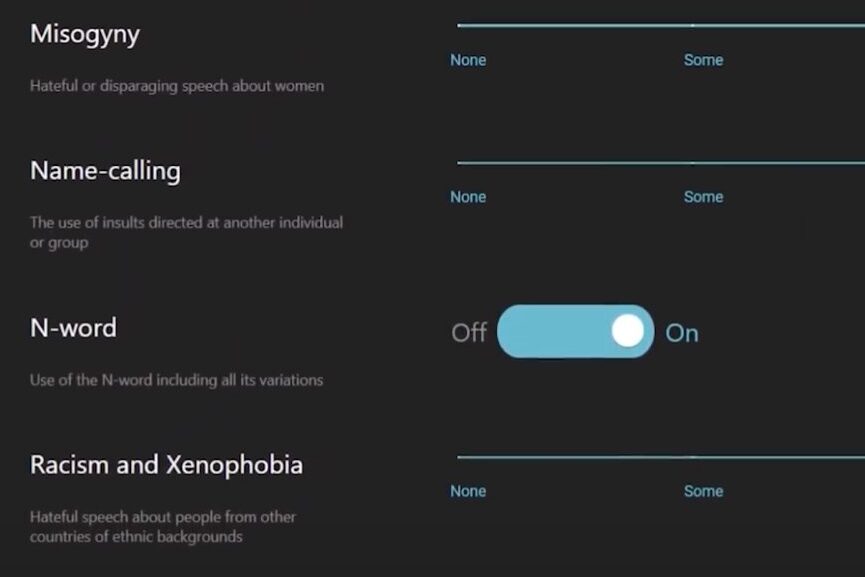Intel Unveils A Tool To Censor Hate Speech In Video Game Voice Chat
Hate speech could be censored in game chats thanks to this new technology.
This article is more than 2 years old

Science fiction anthology series Black Mirror is notorious for predicting dystopian (or otherwise morally ambiguous) scenarios before they happen. “Nosedive” foretold China’s Social Credit System. “Be Right Back” may have inspired BINA48, a personable android developed by Hanson Robotics. “Hated in the Nation” has a real-life equivalent in Harvard’s Aerial-Aquatic Microbots and Japan’s pollen-distributing drones. And now, “Arkangel” — an episode about an overprotective mom hopelessly censoring her daughter’s everyday interactions by remotely manipulating a chip in her brain — is about to become reality. Intel and Spirit AI’s Bleep is an artificial intelligence program capable of recognizing and filtering out abusive language and hate speech from in-game voice chats. The software works in real-time, and can censor audio based entirely on user preferences. The company plans on integrating the AI processor in current-generation Intel-powered PCs in the hopes of artificially suppressing hate speech and discouraging user harassment.
Bleep’s central interface is designed to be easy enough for the average gamer to understand. It operates via toggles and sliders, and allows the player to control exactly how much offensive speech is “bleeped out.” Players can choose to hear “none,” “some,” “most,” or “all” and under which category of slurs: ableism and body-shaming, aggression, LGBTQ+ hate, misogyny, name-calling, racism and xenophobia, sexually explicit language, swearing, white nationalism, and every possible variant of the N-word.
Kim Pallister, general manager of Intel’s gaming solutions team, told Forbes the system is programmed to consider every possible scenario. For instance, players may want to exchange friendly barbs with friends, but not with a stranger. Marcus Kennedy, general manager of Intel’s gaming and esports division, tells Polygon: “The intent of this has always been to put that nuanced control in the hands of the users.” Bleep is currently on beta and was first developed in 2019. The demo was unveiled only this year at the Game Developers Conference (GDC) Expo in San Francisco.
Last year, a study conducted by the Anti-Defamation League found that 81% of Americans aged 18-45 have suffered harassment and prejudice while engaged in online multiplayer games. Conversely, 22% of roughly 1,000 gamers surveyed quit playing eventually after constantly being harassed. The Bleep technology was created specifically to address this level of toxicity and combat online bullying across different gaming platforms. Roger Chandler, vice president and general manager of client XPU products and solutions, hopes to “make gaming better” by regulating its “dark side.” He explains: “While we recognize solutions like Bleep don’t erase the problem, we believe it’s the step in the right direction, giving gamers a tool to control their experience.”
Intel marketing engineer Craig Raymond adds: “With Bleep, we’re enabling gamers to take control of their conversations, one key step to eliminating toxicity in gaming today. The app interfaces our AI models into the Windows architecture to integrate the feature transparently into your voice applications.”
Public response to Bleep hasn’t been encouraging. Players have been roasting the software online, criticizing the sudden need to censor and police language. Like Parler and Facebook, gamers likened the concept to a Black Mirror dystopian special, and have commented on how “ridiculous” it is to want to control free speech to the point of curbing certain civil liberties. Kotaku’s Luke Plunkett writes: “Hateful speech is something that needs to be educated and fought, not toggled on a settings screen.” Chandler responds to the criticism, saying, “We realize technology isn’t the complete answer, but we believe it can help mitigate the problem while deeper solutions are explored.”
Kennedy seconds Chandler while speaking with Forbes, adding, “I think it would have been naive to step into this space to try to do something here if we didn’t expect any kind of dialogue. We absolutely expected this to generate something, but from our perspective, the right thing to do is to continue to anchor on empowering the gamer and we will stand behind that no matter what kind of pushback we get.”
While both sides of the debate make fairly reasonable points, only time will tell if Bleep will actually be socially constructive, or simply reinforce systemic biases already present in gaming.












